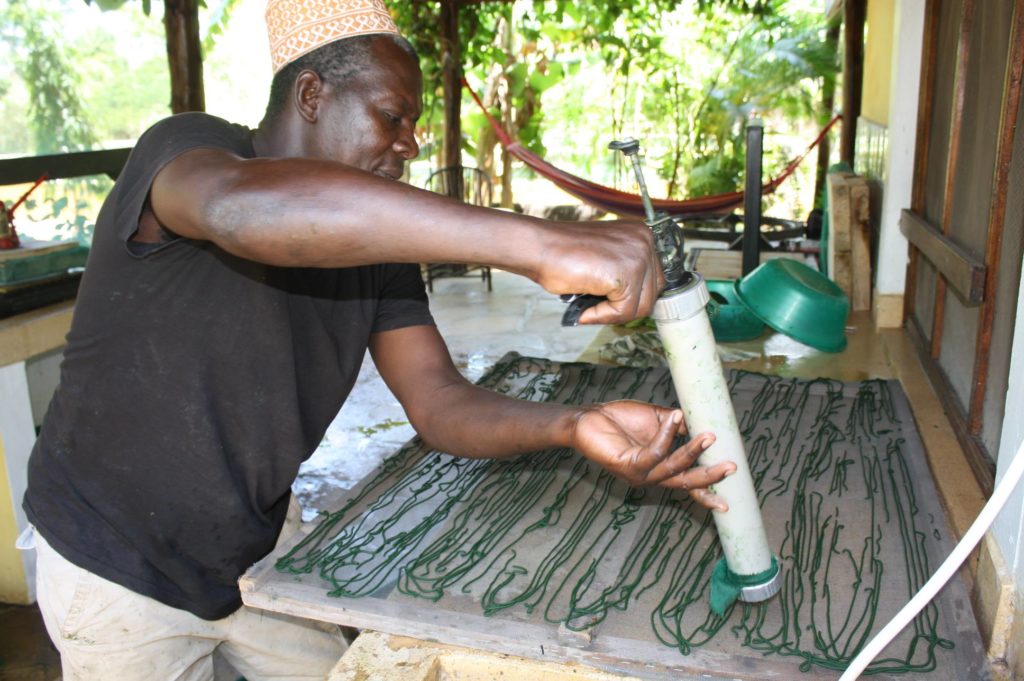In Muhaka, Kwale County, Kugawana Spirulina farm grows at least one tonne of Arthrospira Platensis, commercially known as spirulina every year. This is fed as a supplement in food to children in the locality, offering a more balanced diet in a county where malnutrition in children stands at a worrying 30 per cent.
A Microscopic blue-green algae, spirulina is loaded with micronutrients and recommended by WHO and NASA as a superfood. According to a British Medical Journal (BMJ) report; Can Spirulina be an Answer for Treatment of Malnutrition?; “There’s ample evidence to support the use of Spirulina in the treatment of malnutrition, indeed, it helps in avoidance of malnutrition. It is the single most nutritious food on the planet. The quality of the protein in Spirulina is considered excellent, comparable to eggs. It contains all the essential amino acids that the human body needs. Spirulina is also a good source of protein: gram per gram more so than beef, poultry, fish, and soybeans. Its cultivation is also very economical and does not involve any technical expertise. Its growth rate is also very high. Spirulina contains iron, protein, carbohydrate vitamins, magnesium, potassium, and manganese in the required amounts for the human body. A tablespoon of spirulina contains a small amount of fat (around 1 gram), including both omega-6 and omega-3 fatty acids in about a 1.5:1 ratio. Research further supports that, Spirulina also has antioxidant and anti-inflammatory properties; it modulates the immune response, which helps in fighting against communicable diseases.”
Founded by Dutch couple Yet and Piet van Winsen who grow spirulina commercially in France, Kugawana is an offshoot of Secteur10; a non-profit that has its roots in Burkina Faso.
The couple chose to be headquartered in Kwale County for good reason: According to country health officials, about 30 per cent of children in Kwale suffer from malnutrition; three out of 10 show signs of stunted growth, and one-quarter have heights that do not match their actual age. This is also manifested in their being energy deficient as well as having stunted brain development.
They have partnered with neighboring primary schools; Shine Yetu at Galu and Rainbow 4Kids, Ukunda, where they help feed 400 and 100 kids respectively on spirulina. When schools open from April this year the NGO will begin funding porridge meals fortified with spirulina for 400 children in Kilole Primary School.
Kugawana is run by the couple’s daughter Cathelyne and her husband Matthieu.
“Usually when these kids have access to food, it’ll be ugali and rice; staples which don’t offer sufficiently balanced diets. To help combat this endemic malnutrition, we are working to sensitise parents around the locality on the positive outcomes we’ve seen in improved class attendance and test scores with our spirulina feeding project in Burkina Faso saidCathelyne .
The children consume 3-5 gms of spirulina daily. Kugawana produces six kilograms of dry spirulina daily, meaning the project can feed well over 1200 kids every day.
Despite the algae’s obvious benefits, government red tape and ignorance about spirulina’s potential impact have meant they’ve been unable to upscale production to serve even more people in need.
“The science behind spirulina’s health benefits is proven in studies we have shared with medical institutions we had looked to partner with around Kwale. Getting government authorisation though has thus far been impossible. We also give spirulina culture and lessons on how to cultivate it for free to malnourished households and persons living with HIV,” she explained.
To hurdle these obstacles, Cathelyne and her husband have been working to demystify the crop she describes as supercharged spinach.
Like other algae, spirulina requires water as its growth medium. Commercially it is grown in saline solutions with a pH range of 8-11 meaning it has little competition and bacteria attacks are minimal. A temperature of between 30° to 35° C is required for increased production with high protein content. Kugawana grows their spirulina in four 20✕7M basins that are 18-20cm deep. These are tended to and harvested every morning by five workers from the local community. The growing medium should be shallow and regularly stirred to avoid it getting bunched, maintain water flow which assists in increasing oxygen levels; food, and nutrient intake; prevent the build-up of dead particulate organic material, and evenly distribute light intake which is required for photosynthesis.
 Fertilisers are essential in maintaining the culture and having it yield prolifically; this makes up most of the cost of spirulina farming. They include; sodium bicarbonate, urea, potassium nitrate, potassium and magnesium sulfate, phosphate, and ferica.
Fertilisers are essential in maintaining the culture and having it yield prolifically; this makes up most of the cost of spirulina farming. They include; sodium bicarbonate, urea, potassium nitrate, potassium and magnesium sulfate, phosphate, and ferica.
Once they’ve harvested their spirulina it is pressed into a paste used to make spaghetti. This is then dried in a solar oven and can also be ground.
Kugawana offers free training to community-based humanitarian organisations looking to grow spirulina. About 5-10% of the business is commercialised; a training fee is charged to commercial growers who can also purchase spirulina for their starter farms from them. Additional revenue is generated from purchases made by commercial spirulina farms and tourist site visits which all go to meet the farm’s operational costs.
Spirulina contains 40 to 80% protein content, this protein-rich composition has seen it used as an animal feed. It’s shown to improve animal growth, nutritional product quality, fertility, and reduce mortality.
Contacts: info@secteur10.fr
Read more:
Kakamega youth group cashing in rare Spirulina farming
Algae-based organic fertiliser doubles crop and livestock yields
One year hospital stay that inspired ‘Mkulima Mdogo’s’ farming empire
Kugawana Spirulina, spirulina against malnutrition in Kenya
